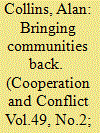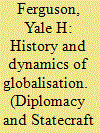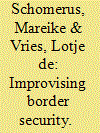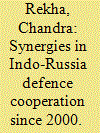|
|
|
Sort Order |
|
|
|
Items / Page
|
|
|
|
|
|
|
| Srl | Item |
| 1 |
ID:
132332


|
|
|
|
|
| Publication |
2014.
|
| Summary/Abstract |
The Association of Southeast Asian Nations (ASEAN) is building a people-oriented community in Southeast Asia and it has all the hallmarks of a Deutschian security community, with its emphasis on people-to-people contact and the involvement of civil society organisations in the community's creation. In this article the argument is made that it is precisely the involvement of the masses that creates the peace inertia associated with security communities, and thus ASEAN's plural turn is an essential first step in making ASEAN's community a security community. Whether ASEAN can actually do this, and indeed whether the membership are united in this objective, is not the focus for this article. Instead, and contrary to the security community literature, which identifies ASEAN as a non-liberal security community and has emphasised the practice of self-restraint, this article argues that past ASEAN practice has prevented a security community forming in Southeast Asia, and using self-restraint as an explanation for why security communities create dependable expectations of peaceful change for members has resulted in the agency of 'community' being neglected. Hence, this article argues for the need to bring 'community' back.
|
|
|
|
|
|
|
|
|
|
|
|
|
|
|
|
| 2 |
ID:
132627


|
|
|
|
|
| Publication |
2014.
|
| Summary/Abstract |
Within the last twenty years, China has become dependent on import of coal, oil and natural gas. Especially oil is now an economic and a security concern by the Chinese regime and key international stakeholders. Until 2035, China will account for one fourth of the global net growth in global gas consumption and more than half of the net growth in oil consumption. The future demand cannot be covered by China×s own conventional and unconventional sources. Pipelines from neighboring countries can cover more than half of the needed import of natural gas by 2030, but only 10 percent of the import demand of oil is secured so far. Even if China attempts to address its insufficient supply of oil by increased investments in overseas oil fields, there is still a large gap. Furthermore, the oil import will largely come from politically unstable countries and regions, and the bulk of the supplies must be shipped through the potentially insecure Hormuz and Malacca Straits. The ongoing territorial disputes with neighboring countries regarding areas with gas and oil reserves in contested waters bear evidence to regional conflict potentials, and China appears to engage more actively in energy diplomacy and regional cooperation.
|
|
|
|
|
|
|
|
|
|
|
|
|
|
|
|
| 3 |
ID:
129682


|
|
|
|
|
| Publication |
2014.
|
| Summary/Abstract |
Globalisation involves geographically wider transaction networks and has multiple interrelated dimensions. The globalisation process has geographical scope, volume and density of transactions, and a direction and pace of change. Globalization has a long history, and the local and the global have almost continuously interacted. Most forward changes have been incremental, and there have also been major reversals or almost complete system-breakdowns. There are numerous drivers of globalization of different types, persons, and groups with varying motives, and anonymous drivers like technology, weather, and disease. The article devotes most attention to a review of selected patterns and trends in contemporary globalisation These are climate change; demographic trends, income inequality, and migration; security concerns, technology, and peacekeeping; competing ideologies; the global economy, equities, trade, banking reform, and tax havens; and shifting power relationships among the United States, Europe, China, Japan, and Emerging Markets.
|
|
|
|
|
|
|
|
|
|
|
|
|
|
|
|
| 4 |
ID:
132339


|
|
|
|
|
| Publication |
2014.
|
| Summary/Abstract |
This article compares two cases of securitization along South Sudan's border with the Democratic Republic of the Congo. By comparing how a security concern - the presence of the Lord's Resistance Army - was interpreted and responded to, the article shows that border security practices in two borderscapes are improvised, contradictory and contested, and serve to establish authority rather than actually securing the border. This is apparent on three levels: (a) through the multiplicity of security actors vying for authority; (b) in how they interpret security concerns; and (c) in terms of what practice follows. The article argues that by allowing authority at the border to be taken by actors that are not under direct control of the central government, the South Sudanese state is developing as one that controls parts of the country in absentia, either by granting discretionary powers to low-level government authorities at the border or through tactical neglect. Processes of securitization by both state and non-state actors in the borderland are largely disconnected from the South Sudanese central government, which does not claim authority over this border and thus seemingly does not consider the lack of security for its citizens, and the parallel authorities, as a threat to central stability.
|
|
|
|
|
|
|
|
|
|
|
|
|
|
|
|
| 5 |
ID:
132581


|
|
|
|
|
| Publication |
2014.
|
| Summary/Abstract |
Defence cooperation has been the major plank in the bilateral relations between India and Russia. It can be argued that the relations between the two countries ?ourished due to the common threat perceptions and the international milieu during the Cold War period. It can also be stated that the current scenario in the strategic partnership between the Kremlin and Delhi has remained strong due to the geo- political imperatives, shared security concerns and mutual benefits which mostly emerged through strong defence ties.
|
|
|
|
|
|
|
|
|
|
|
|
|
|
|
|
|
|
|
|
|